人教版小学英语六年级上册英语词组
人教版新版PEP小学六年级上册英语语法表
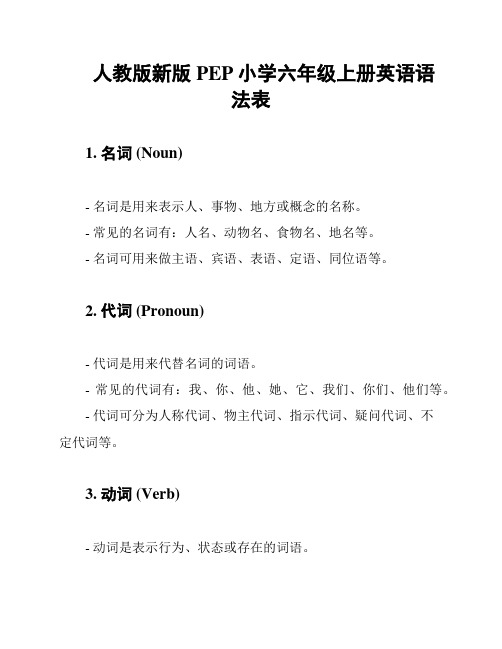
人教版新版PEP小学六年级上册英语语法表1. 名词 (Noun)- 名词是用来表示人、事物、地方或概念的名称。
- 常见的名词有:人名、动物名、食物名、地名等。
- 名词可用来做主语、宾语、表语、定语、同位语等。
2. 代词 (Pronoun)- 代词是用来代替名词的词语。
- 常见的代词有:我、你、他、她、它、我们、你们、他们等。
- 代词可分为人称代词、物主代词、指示代词、疑问代词、不定代词等。
3. 动词 (Verb)- 动词是表示行为、状态或存在的词语。
- 动词分为实义动词和虚义动词,实义动词可以独立构成句子的谓语。
- 动词还可以根据时态、语态、语气等形式进行变化。
4. 形容词 (Adjective)- 形容词是用来描述名词的特点和性质的词语。
- 形容词通常位于名词前面作定语。
- 形容词可以比较级和最高级,并可根据名词的性质进行变化。
5. 副词 (Adverb)- 副词是用来修饰动词、形容词和其他副词的词语。
- 副词可以回答疑问词how、when、where等问题的词语。
- 副词可用来修饰句子和句子的成分。
6. 冠词 (Article)- 冠词是表示名词特指与泛指的词语。
- 冠词分为定冠词和不定冠词,定冠词包括"the",不定冠词包括"a"和"an"。
- 冠词用来限定名词的范围和数量。
7. 介词 (Preposition)- 介词是用来表示名词与其他词之间关系的词语。
- 常见的介词有:in、on、at、above、below等。
- 介词通常位于名词或代词的前面。
8. 连词 (Conjunction)- 连词是用来连接句子、词语或词组的词语。
- 常见的连词有:and、but、or、so等。
- 连词可以连接并列关系、选择关系、原因和结果关系等。
9. 数词 (Numeral)- 数词是用来表示数量的词语。
- 数词分为基数词和序数词,基数词用来表示数量的多少,序数词用来表示次序和顺序。
新人教版(PEP)小学英语六年级上册各单元知
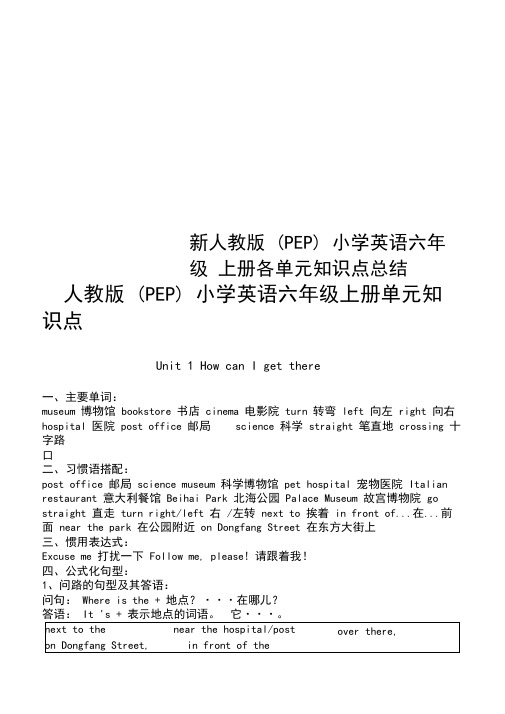
新人教版 (PEP) 小学英语六年级上册各单元知识点总结人教版(PEP) 小学英语六年级上册单元知识点Unit 1 How can I get there一、主要单词:museum 博物馆bookstore 书店cinema 电影院turn 转弯left 向左right 向右hospital 医院post office 邮局science 科学straight 笔直地crossing 十字路口二、习惯语搭配:post office 邮局science museum 科学博物馆pet hospital 宠物医院Italian restaurant 意大利餐馆Beihai Park 北海公园Palace Museum 故宫博物院go straight 直走turn right/left 右/左转next to 挨着in front of...在...前面near the park 在公园附近on Dongfang Street 在东方大街上三、惯用表达式:Excuse me 打扰一下Follow me, please! 请跟着我!四、公式化句型:1、问路的句型及其答语:问句:Where is the + 地点?···在哪儿?答语:It 's + 表示地点的词语。
它···。
2、询问怎么到某地的句型及其答语:问句:How can +主语+ get (to)+地点?···怎么到···?同义句型:Can you tell me the way to + 地点?Where is + 地点?Which is the way to + 地点?答语:Turn +方向+表示地点的介词短语。
···转。
at the cinema at the corner near the post office...五、例句:Where is the cinema, please? 请问电影院在哪里?It ' s next to the hospital. 它与医院相邻。
人教版小学英语六年级上册第二单元知识点
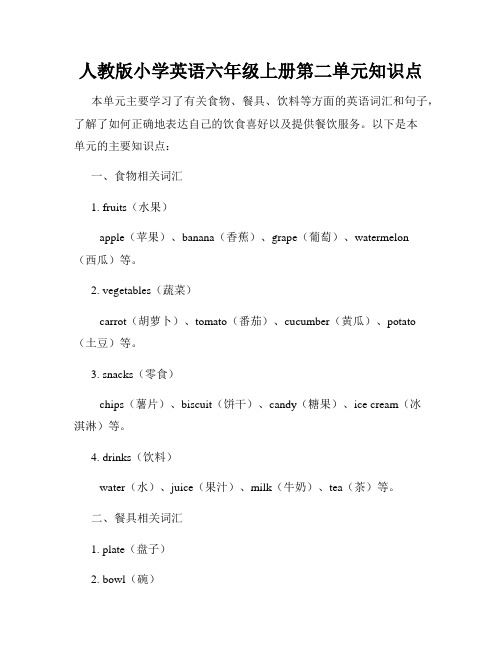
人教版小学英语六年级上册第二单元知识点本单元主要学习了有关食物、餐具、饮料等方面的英语词汇和句子,了解了如何正确地表达自己的饮食喜好以及提供餐饮服务。
以下是本单元的主要知识点:一、食物相关词汇1. fruits(水果)apple(苹果)、banana(香蕉)、grape(葡萄)、watermelon(西瓜)等。
2. vegetables(蔬菜)carrot(胡萝卜)、tomato(番茄)、cucumber(黄瓜)、potato (土豆)等。
3. snacks(零食)chips(薯片)、biscuit(饼干)、candy(糖果)、ice cream(冰淇淋)等。
4. drinks(饮料)water(水)、juice(果汁)、milk(牛奶)、tea(茶)等。
二、餐具相关词汇1. plate(盘子)2. bowl(碗)3. cup(杯子)4. glass(玻璃杯)5. spoon(勺子)6. fork(叉子)7. knife(刀子)三、常用句子1. What would you like to eat/drink?(你想吃/喝点什么?)2. I would like some...(我想要一些...)3. Here you are.(给你。
)4. Can I have some water, please?(请给我一些水。
)5. How about some apples?(要不要一些苹果?)6. Do you have any snacks?(你有零食吗?)7. I don't like...(我不喜欢...)8. I love...(我喜欢...)9. Can I help you?(需要帮助吗?)10. What's your favorite food/drink?(你最喜欢的食物/饮料是什么?)四、简单对话练习A: What would you like to eat?B: I would like some noodles.A: Here you are.B: Thank you.A: You're welcome.A: Do you have any snacks?B: Yes, we have chips, biscuits, and candy.A: Can I have some chips, please?B: Of course, here you go.A: Thank you so much.A: What's your favorite fruit?B: My favorite fruit is watermelon.A: How about some grapes?B: No, thanks. I don't like grapes.五、培养学生的听、说、读、写能力在课堂上,教师可以通过听取录音、模仿句子、读课文、角色扮演对话等多种方式培养学生的听、说、读、写能力。
人教版6年级英语上册重点单词和短语

一、人教版6年级英语上册重点单词和短语1. apple - 苹果2. banana - 香蕉3. orange - 橙子4. grape - 葡萄5. pineapple - 菠萝6. watermelon - 西瓜7. pear - 梨8. strawberry - 草莓9. mango - 芒果10. lemon - 柠檬11. Hello! - 你好!12. Good morning! - 早上好!13. Good afternoon! - 下午好!14. Good evening! - 晚上好!15. Goodbye! - 再见!16. Thank you! - 谢谢!17. Sorry. - 对不起。
18. Please. - 请。
19. Excuse me! - 对不起,打扰一下!20. How are you? - 你好吗?二、人教版6年级英语上册重点句型1. What's this? - 这是什么?It's a/an… - 是…2. Is this a…? - 这是…吗?Yes, it is. / No, it isn't. - 是的,/不,它不是。
3. What color is it? - 它是什么颜色的?It's… - 它是…4. How many…? - 多少…There are… - 有…5. Can I have…? - 我可以要…吗?Here you are. - 给你。
6. Do you like…? - 你喜欢…吗?Yes, I do. / No, I don't. - 是的,/不,我不喜欢。
7. What can you see? - 你能看到什么?I can see… - 我能看到…8. How old are you? - 你多大了?I'm… - 我…9. What's the weather like? - 天气怎么样?It's… - 天气…10. What do you like doing? - 你喜欢做什么?I like… - 我喜欢…三、人教版6年级英语上册重点课文1. Unit 1 - Hello!- Let’s talk- Let’s sing- Let’s chant- Let’s do2. Unit 2 - What's this in English?- A for apple- B for banana- C for cat- Let's learn3. Unit 3 - How many…?- Four- Five- Six- Let’s learn4. Unit 4 - Can I have some rice?- Yes, please.- No, thank you.- Let’s learn5. Unit 5 - How old are you?- I'm ten years old.- Let’s learn6. Unit 6 - Is this your skirt?- Yes, it is.- No, it isn't.- Let’s learn7. Unit 7 - What’s the weather like? - It's sunny.- It's windy.- Let’s learn8. Unit 8 - What do you like doing?- I like swimming.- I like reading.- Let’s learn四、人教版6年级英语上册重点语法1. 名词单数和复数形式- 一般情况下,名词单数变为复数,直接在词尾加-s。
最新人教版六年级上册重点短语整理

最新人教版六年级上册重点短语整理本文收集了最新人教版六年级上册的重点短语,供大家参考:- 问路- Excuse me, how can I get to...? 对不起,请问去...怎么走?- Is it far from here? 这离这儿远吗?- Can I go on foot? 我能走路去吗?- Where is the nearest...? 最近的...在哪里?- 祝愿- Congratulations! 恭喜!- Good luck! 祝你好运!- Happy birthday! 生日快乐!- Merry Christmas! 圣诞快乐!- 问候- How are you? 你好吗?- Nice to meet you! 很高兴见到你!- Have a good day! 祝你今天愉快!- Take care! 保重!- 时间- What day is it today? 今天星期几?- What's the date today? 今天几号?- What time is it now? 现在几点了?- How long will it take? 要花多长时间?- 点餐- What would you like to eat/drink? 你想吃/喝什么?- Can I have the menu, please? 请给我菜单。
- I'll have... 我要...- How much is it? 多少钱?- 数字- Can you spell it for me? 能拼写一下吗?- One, two, three, four, five, six, seven, eight, nine, ten. 一、二、三、四、五、六、七、八、九、十。
- Eleven, twelve, thirteen, fourteen, fifteen, sixteen, seventeen, eighteen, nineteen, twenty. 十一、十二、十三、十四、十五、十六、十七、十八、十九、二十。
小学英语六年级上册人教版第一单元复习
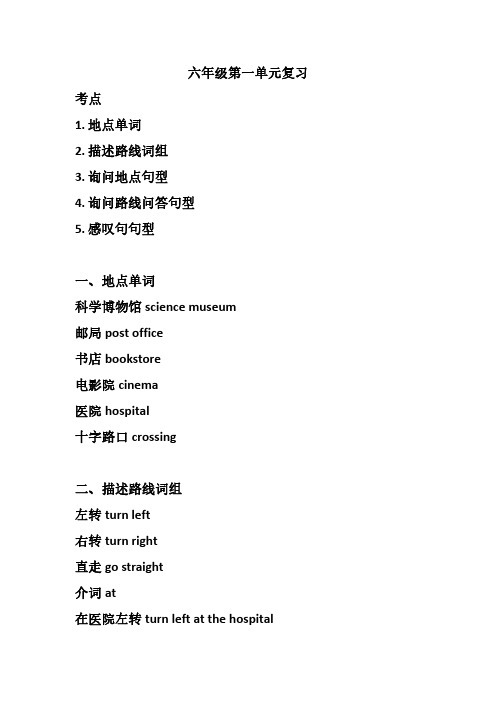
六年级第一单元复习考点1.地点单词2.描述路线词组3.询问地点句型4.询问路线问答句型5.感叹句句型一、地点单词科学博物馆science museum邮局post office书店bookstore电影院cinema医院hospital十字路口crossing二、描述路线词组左转turn left右转turn right直走go straight介词at在医院左转turn left at the hospital在邮局左转turn left at the post office在书店右转turn right at the bookstore在电影院右转turn right at the cinema在十字路口直走go straight at the crossing二、询问地点句型句型问:Where is+地点?答:It's+方位介词+地点.1.医院在哪?在电影院旁边。
Where is the hospital?It’s near the cinema.2.电影院在哪?紧挨着科学博物馆。
Where is the cinema?It’s next to the science museum.3.书店在哪?在邮局的前面。
Where is the bookstore?It’s in front of the post office.三、询问路线句型句型问:How can+主语+get there?How can+主语+get to+地点?答:Turn right/Turn left/go straight+at+地点.1.我们如何到达那儿?How can we get there?2.我如何到达那儿?How can I get there?3.我如何到科学博物馆?How can I get to the science museum?4.我如何到学校?How can I get to school?5.我们如何到达电影院?How can we get to the cinema?6.我们如何到达邮局?How can we get to the post office? 7.我们如何到家?How can we get home?四、感叹句句型句型结构What a/an+形容词+名词!1.多么有趣的电影啊!What an interesting film!2.多么棒的博物馆啊!What a great museum!3.多么漂亮的房间呀!What a nice room!。
人教版小学英语六年级上册全册单词表【全套】

人教版小学英语·六年级上册·单词表Unit 1by[bai] 经,乘foot[fut] 脚bike[baik] 自行车bus[bʌs] 公共汽车train[trein] 火车plane[plein]飞机ship[ʃip] 船;舰subway ['sʌbwei] 地铁how[hau] 怎样go to school [ɡəu tu: sku:l]上学then [ðen] 然后fifth[fifθ] 第五traffic['træfik]交通traffic light['lait]交通灯traffic rule[ru:l]交通规则stop[stɔp]停,停车站wait[weit]等待remember[ri'membə] 记住get to[ɡet tu:]到达find [faind]寻找;找到difference ['difərəns]不同;区别same [seim]相同的every['evri] 每个;所有的country['kʌntri] 国家always['ɔ:lweiz, -wiz] 总是mean [mi:n]意思是drive [draiv]驾驶right[rait] 右边的side[said] 边England['iŋɡlənd] 英国Australia [ɔ:'streiljə]澳大利亚however [hau'evə]但是left [left]左边的if [if]如果must [mʌst, məst]必须know [nəʊ]知道Unit 2library['laibrəri] 图书馆post[pəust] office['ɔfis, 'ɔ:-] 邮局hospital ['hɔspitəl] 医院cinema['sinəmə] 电影院bookstore['bukstɔ:] 书店science ['saiəns] museum [mju:'ziəm] 科学博物馆excuse[ik'skju:z, ik'skju:s] me[mi:, mi] 对不起where[hwɛə]在哪里,到哪里please[pli:z]请next to[nekst tu:]与…相邻far[英] [fɑ:] [美] [fɑr]远supermarket['sju:pə,mɑ:kit] 超市bank [bæŋk]银行after school ['ɑ:ftə sku:l]放学以后want [wɔnt]想要buy [bai]买a pair of [ə pɛəɔv]一双shoe store [ʃu:] [stɔ:]鞋店get off [ɡet ɔf]下车minute['minit] 分钟north [nɔ:θ]北south [sauθ, sauð]南east [i:st]东west[west] 西turn[tə:n] 转弯right [rait]右边left [left]左边straight[streit]成直线地then[ðen] 然后twelfth[twelfθ] 第二十party['pɑ:ti]聚会;晚会tell [tel]告诉start[stɑ:t] 开始take [teik]乘坐look for [luk fɔ:]寻找Unit 3next week[nekst wi:k]下周this morning[ðis 'mɔ:niŋ]今天上午this afternoon[ðis 'ɑ:ftə 'nu:n]今天下午this evening [ðis 'i:vniŋ]今天晚上tonight [tə'nait]今晚tomorrow [tə'mɔrəu]明天take a trip [teik ətrip] 去旅行read a magazine [ri:d ə,mæɡə'zi:n] 阅读杂志go to the cinema [ɡəu tu: ðə'sinəmə]去看电影theme park [θi:m pɑ:k] 主题公园the Great Wall [ðəɡreit wɔ:l]长城busy['bizi] 忙碌的together[tə'ɡeðə] 一起地comic book['kɔmik buk]漫画书post card [pəust kɑ:d]明信片newspaper ['nju:s,peipə, 'nju:z-]报纸magazine[,mæɡə'zi:n] 杂志dictionary['dikʃənəri] 词典;字典buy[bai] 购买fruit stand [fru:t stænd]水果摊pet shop [pet ʃɔp]宠物商店need[ni:d] 需要plant[plɑ:nt, plænt] 植物else[els] 其他;另外shop[ʃɔp] 商店Unit 4hobby[英] [ˈhɔbi] [美] [ˈhɑbi]爱好ride a bike [raid ə baik] --riding['raɪdɪŋ] a bike骑自行车dive[daiv] --diving['daɪvɪŋ]跳水play [pleɪ] the [ðə] violin—playing [pleiŋ] the violin[,vaiə'lin] 拉小提琴make [meik] kites [kaits]—making ['meɪkɪŋ] kites制作风筝collect[kə'lekt] stamps [stæmps]—collecting [kə'lektɪŋ] stamps集邮show [ʃəu] 展览pen pal [pen pæl]笔友dear[diə] 亲爱的twin[twin] 双胞胎之一look [luk]看上去something ['sʌmθiŋ]某事物must [mʌst, məst]一定;肯定fun [fʌn]快乐;乐趣with [wið]同…TV['ti:'vi:] reporter[ri'pɔ:tə]电视台记者live[liv] –lives[laɪvz]居住teach[ti:tʃ] --teaches[ti:tʃiz]教go [ɡəu] --goes[ɡəuz]去watch[wɔtʃ] --watches[wɔtʃiz]看read[ri:d] --reads[ri:dz]读,看does [dʌz,dəz]doesn’t ['dʌznt] =does[dʌz,dəz] not[nɔt]different['difərənt] 不同的week[wi:k] 星期;周say[sei] 说soon [su:n]不久excited[ik'saitid] 兴奋的;激动的Unit 5singer['siŋə] 歌唱家,歌手writer['raitə] 作家actor['æktə] 男演员actress['æktris] 女演员artist['ɑ:tist]画家TV reporter[ri'pɔ:tə] 电视台记者Hong Kong ['hɔŋ'kɔŋ, -'kɔŋ, 'hɔ:ŋ'kɔ:ŋ, -'kɔ:ŋ]香港engineer[,endʒi'niə] 工程师accountant[ə'kauntənt] 会计policeman[pə'li:smən] 男警察salesperson['seilz,pə:sən] 销售员cleaner['seilz,pə:sən] 清洁工company['kɔmpəni] 公司where[hwεə]在哪里,到哪里work[wə:k]工作factory['fæktəri] 工厂design [di'zain]设计tip[tip] 有用的小建议help [help]帮助money ['mʌni]钱well [wel]好;对;满意地enjoy [in'dʒɔi]从…获得乐趣tourist ['tuərist]旅行者;way [wei]路;道motor cycle['məutə 'saikl] 摩托车police[pə'li:s] 警方;警察部门Unit 6rain[rein] 雨cloud[klaud] 云vapour['veipə] 蒸汽;水汽sun[sʌn] 太阳stream[stri:m] 河,溪come from[kʌm frɔm]来自,从…来shine [ʃain]照耀become [bi'kʌm]变成little ['litl]小的drop [drɔp]一滴wake[weik] up [ʌp]醒来feel ['fi:l]感觉到think[θiŋk] 想;思考meet[mi:t] 遇见high[hai] 高的other ['ʌðə]其他的fall [fɔ:l]落下down[daun] 向下into ['intu:]进入come out [kʌm aut]露出again[ə'ɡen] 又seed[si:d] 种子soil[sɔil] 土壤sprout[spraut] 苗,芽plant[plɑ:nt, plænt] 植物,种植should [ʃud, ʃəd]应该then [ðen]然后garden ['ɡɑ:dn]花园easy['i:zi] 简单的put[put] 放several['sevərəl] 一些day [dei]天see [si:]看见pot [pɔt]锅碗瓢盆lovely['lʌvli] 可爱的make sure [meik ʃuə]核实month[mʌnθ]月份still[stil] 仍然hardly ['hɑ:dli]几乎不六年级上册英语单词表(人教版)六年级上册英语单词表Unit1bfootbiebustrainplane飞机ship船;舰subay地铁hogotoschoolfifth第五traffictrafficlighttrafficrulestopaitreeber记住gettofind寻找;找到difference不同;区别sae相同的every每个;所有的country国家alays总是ean意思是drive驾驶right右边的side边England英国Australia澳大利亚hoever但是left左边的if如果ust必须no知道Unit2librarpostofficehospital cineaboostore scienceuseu科学博物馆excusee对不起hereplease nexttofar远superaret超市ban银行afterschool放学以后ant想要buy买apairof一双shoestore鞋店getoff下车inute分钟north北south南east东est西turnrightleftstraightthentelfth第二十party聚会;晚会tell告诉start开始tae乘坐loofor寻找Unit3 nexteethisorningthisafternoonthisevening tonight今晚toorro明天taeatrip去旅行readaagazine阅读杂志gotothecinea去看电影theepar主题公园theGreatall长城busy忙碌的together一起地icboopostcardnespaperagazine杂志dictionary词典;字典bufruitstand水果摊petshop宠物商店need需要plant植物else其他;另外shop商店hobbrideabie--ridingabiedive--divingplaytheviolin—playingtheviolinaeites—aingitescollectstaps—collectingstapssho展览penpal笔友dear亲爱的tin双胞胎之一soething某事物ust一定;肯定fun快乐;乐趣ith同…TVreporter电视台记者live–livesteach--teachesgo--goesatch--atchesread--reads doesdoesn’t=doesnotdifferent不同的ee星期;周say说soon不久excited兴奋的;激动的singerriteractoractressartistTVreporterHongong香港engineeraccountantpoliceansalespersoncleaner pany公司hereorfactory工厂design设计tip有用的小建议help帮助oney钱ell好;对;满意地enjoy从…获得乐趣tourist旅行者;ay路;道otorcycle摩托车police警方;警察部门Unit6raincloudvapour蒸汽;水汽sunstreaefroshine照耀bee变成little小的drop一滴aeup醒feel感觉到thin想;思考eet遇见high高的other其他的fall落下don向下into进入eout露出again又seedsoilsproutplant shouldthengarden花园easy简单的put放several一些day天see看见pot锅碗瓢盆lovely可爱的aesure核实onth月份still仍然hardly几乎不。
人教版小学六年级英语上册单词汇总

★这篇《⼈教版⼩学六年级英语上册单词汇总》,是⽆忧考特地为⼤家整理的,希望对⼤家有所帮助!本⽂为⼈教新起点版英语⼩学六年级上册单词汇总,包括在中国、全世界、动物世界、感觉、名⼈、未来。
注:*词汇为超纲词汇Unit1province 省 east东;东⽅ south 南;南⽅ west西;西⽅ north北;北⽅the Potala Palace 布达拉宫 the Shaolin Temple 少林寺 Yellow Mountain 黄⼭the Stone Forest ⽯林 Elephant Trunk Hill 象⿐⼭ Tibet 西藏Mountain Tai 泰⼭ snow-capped mountain 雪⼭ the warriors 兵马俑the Mogao Caves 莫⾼窟 silk 丝绸 Chinese tea中国茶 Mountain Emei 峨眉⼭Unit 2Continent洲;⼤陆 Asia 亚洲 Europe 欧洲 Africa ⾮洲 North America 北美洲South America 南美洲 Oceania ⼤洋洲 Egypt 埃及 Spain 西班⽛the United States 美国 Thailand 泰国 Australia 澳洲;澳⼤利亚Russia 俄罗斯 Chinese 汉语 French 法语 Russian 俄语Japanese ⽇语 pyramid ⾦字塔 koala 树袋熊 kangaroo 袋⿏Unit3reptile 爬⾏动物 mammal 哺乳动物 insect 昆⾍ crocodile 鳄鱼ostrich 鸵鸟 penguin 企鹅 whale 鲸 shark 鲨 hippo 河马zebra 斑马 lion 狮⼦ butterfly 蝴蝶 hummingbird 蜂鸟centimeter 厘⽶ giraffe 长颈⿅ meter ⽶ kilometer千⽶strong 强壮的 wing 翅膀 ton 吨 heavy 重的Unit 5surprised 惊讶的 angry ⽣⽓的 happy 快乐的;⾼兴的 worried 忧愁的 sad伤⼼的excited 兴奋的 nervous 紧张的 proud 骄傲的Unit 6artist 艺术家;(尤指)画家 actor 演员 musician ⾳乐家 writer 作家scientist 科学家 inventor 发明家 Chinese 中国⼈ German德国⼈Danish 丹麦⼈ English 英格兰⼈ American 美国⼈compose写;创作(乐曲、歌剧等) national anthem 国歌 Peking opera 京剧shrimp 虾 invent 发明 light bulb 灯泡 story 故事Unit 7astronaut 宇航员 detective 侦探 professor 教授 president (学院的)院长principal(中⼩学校的)校长 sun 太阳 moon⽉亮 ocean 海洋cloud 云彩 robot 机器⼈ housework 家务劳动 pollution 污染pill 药⽚ peace和平 earth地球 spaceship宇宙飞船 Mars ⽕星。
最新人教版小学英语六年级上册单元词汇表英文部分附音标

六年级上册 words ineach unitUnit 1science ['saɪəns]museum [mjuː'zɪəm]post office [pəʊst] ['ɒfɪs] bookstore ['bʊkstɔː]cinema ['sɪnɪmə; -mɑː]hospital ['hɒspɪt(ə)l] crossing ['krɒsɪŋ]turn [tɜːn]left [left]straight [streɪt]right [raɪt]ask [ɑːsk]sir [sɜː]interesting ['ɪnt(ə)rɪstɪŋ] Italian [ɪ'tæljən]restaurant ['restərɒŋ]pizza ['piːtsə; 'pɪtsə]street [striːt]get [get]GPSgave [ɡeɪv] feature ['fiːtʃə] follow ['fɒləʊ] far [fɑː]tell [tel]unit 2on footby [baɪ]bus [bʌs]plane [pleɪn] taxi ['tæksɪ] ship [ʃɪp] subway ['sʌbweɪ] train [treɪn] slow [sləʊ] down [daʊn]slow downstop [stɒp]Mrs ['misiz] early ['ɜːlɪ] helmet ['helmɪt]must [mʌst]wear [weə]attention [ə'tenʃ(ə)n]pay attention totraffic ['træfɪk]traffic lights [laɪt]Munich ['mju:nik]Germany ['dʒɜːmənɪ]Alaska [ə'læskə]sled [slɛd]fast [fɑːst]ferry ['ferɪ]Papa WestrayScotland ['skɔtlənd]Unit 3visit ['vɪzɪt]film [fɪlm]see a filmtrip [trɪp]take a tripsupermarket ['suːpəmɑːkɪt; 'sjuː-]evening ['iːv(ə)nɪŋ]tonight [tə'naɪt]tomorrow [tə'mɒrəʊ]next weekdictionary ['dɪkʃ(ə)n(ə)rɪ] comic ['kɒmɪk]comic bookword [wɜːd]word bookpostcard ['pəʊs(t)kɑːd]lesson ['les(ə)n]space [speɪs]travel ['træv(ə)l]half [hɑːf]price [praɪs]Mid-Autumn Festival [mɪd] ['ɔːtəm] ['festɪv(ə)l]together [tə'geðə]get togethermooncake ['mu:nkeik]poem ['pəʊɪm]moon [muːn]unit 4studies ['stʌdiz]puzzle ['pʌz(ə)l]hiking ['haɪkɪŋ]pen pal [pen] [pæl]hobby ['hɒbɪ]jasmine ['dʒæzmɪn; 'dʒæs-] idea [aɪ'dɪə]Canberra ['kænbərə]amazing [ə'meɪzɪŋ]shall [ʃæl; ʃ(ə)l]goal [gəʊl]join [dʒɒɪn]club [klʌb]share [ʃeə]unit 5factory ['fækt(ə)rɪ]worker ['wɜːkə]postman ['pəʊs(t)mən] businessman ['bɪznɪsmən] police officer [pə'liːs] ['ɒf ɪsə]fisherman ['fɪʃəmən] scientist ['saɪəntɪst] pilot ['paɪlət]coach [kəʊtʃ]country ['kʌntrɪ]head teachersea [siː]stay [steɪ]university [juːnɪ'vɜːsɪtɪ] gym [dʒɪm]if [ɪf]reporter [rɪ'pɔːtə]use [juːz]type [taɪp]quickly ['kwɪklɪ] secretary ['sekrɪt(ə)rɪ] unit 6angry ['æŋgrɪ]afraid [ə'freɪd]sad [sæd]worried ['wʌrɪd]happy ['hæpɪ]see a doctorwear [weə]more [mɔː]deep [diːp]breath [breθ]take a deep breath count [kaʊnt]count to ten chase [tʃeɪs]mice [maɪs]bad [bæd]hurt [hɜːt]ill [ɪl]wrong [rɒŋ]should [ʃʊd]feel [fiːl]well [wel]sit [sɪt]grass [grɑːs]hear [hɪə]ant [ænt]worry ['wʌrɪ]stuck [stʌk]mud [mʌd]pull [pʊl]everyone ['evrɪwʌn]useful expressionsunit 1Where is the museum shop?It’s near the door.How can we get there?Turn left at the bookstore. Unit 2How do you come to school? Usually, I come on foot.In the USA people on bikes must wear one.Don’t go at the red light!I must pay attention to the traffic lights!Unit 3What are you going to do tomorrow?I’m going to have an artlesson.We’re going to draw some pictures in Renmin park. Where are you going?We’re going to the cinema. When are you going?Unit 4What are Peter’s hobbies?He likes reading stories. Does he live in Sydney?No, he doesn’t.Does he like doing word puzzles and going hiking? Yes, he does.Unit 5What does he do?He’s a businessman.Where does he work?He works at sea.How does he go to work?He goes to work by bike.Unit 6They’re afraid of him.The cat is angry with them. What’s wrong?Your father is ill.He should see a doctor this morning.Don’t be sad.ProverbsBetter to ask the way than go astray.Horses for courses.Think today and speak tomorrow.A friend in need is a friend indeed.Like father, like son.No pleasure without pain.。
人教版小学英语六年级英语上下册知识点复习考点

人教版小学英语六年级上下册知识点复习要点上册1、地点单词 hospital2、方位介词 between on in3、动作词组 go straight4、Where is the +地点?5、How can +主语+get to+地点6、交通方式词组7、有关交通信号用语8、How do you get to+地点?9、频度副词10、活动短语11、书籍类词语12、一般将来时两种表达方式13、主语+be going to14、询问去哪里 Where are you going?15、作文 My weekend plan16、动词三单形式17、常用短语归类18、询问某人的爱好19、like to +20、辅音字母y 结尾变y为i加es21、现在分词变化规则22、职业词汇23、询问职业24、询问工作地点25、询问去工作的方式26、表达感情的词语27、询问对方的感觉28、should情态动词的用法29、be afraid of用法下册1、比较级在一般现在时的运用2、询问年龄、身高、体重H ow old……How tall……3、询问物品的情况4、形容谁比谁更……5、过去时态动词词组6、动词过去时变化规则7、询问某人周末过得怎么样8、Did 引导的一般疑问句,就过去发生的某种行为动作进行问答9、What 引导的特殊疑问句,就过去已经发生的行为进行问答10、一般过去时的特殊疑问句11、询问对方的身体状况12、过去时间表达法13、一般现在时和一般过去时区分14、表示过去不能做或者不会做的句型I can’t do……15、表示不喜欢的句型I don’t like……16、表示以前没有某物的句型17、用Before和Now描述以前和现在不同的情形Before……Now……18、肯定句变否定句的用法19、组词成句的方法20、形容词比较级和最高级的变化规则big-bigger-biggest21、一般过去时的定义。
小学英语短语人教版六年级上册短语

小学英语短语:人教版六年级上册短语以下是整理的“小学英语短语:人教版六年级上册短语”内容,供大家参考学习,希望大家可以仔细阅读。
若想了解更多“小学英语短语”的相关内容,可以关注,小编会持续为大家更新。
1、come to 来到…2、make noise 制造噪音3、be doing 正在进行时4、a list of 一览表,清单5、hand in 上交6、on time 准时,按时7、ask questions 问问题8、be quiet 请安静9、tell sb to do sth 告诉某人做某事10、at home 在家11、make a mess 乱扔乱放东西12、help to do sth 帮助做某事13、watch TV 看电视14、go to bed 上床睡觉15、keep…clean保持…清洁16、go home 回家17、too late 太晚18、wait for 等候…19、keep off 不接近20、take good care of 照顾好…21、in front of 在…前面22、hold up 举起23、tell sb about sth告诉某人做某事24、go to school 去上学25、from…to从…到26、get home 回到家27、in the morning 在上午,在早晨28、in the evening 在晚上29、have breakfast 吃早饭30、have lunch 吃午饭31、have dinner 吃晚饭32、get up 起床33、have classes 上课34、be glad to do…很高兴做35、be kind to 对…好36、take a walk 散步37、play with 和…一起玩38、go out 出去,外出39、go shopping 去购物40、stay up late 熬夜41、want to do 想要做…42、talk with 和…交谈43、quick lunch 快餐44、go on 继续,进行45、learn from 向…学习46、have meals 吃饭47、be going to do 将要做…48、be interested in 对…感兴趣49、collect stamps集邮50、collect candy paper 收集糖纸51、collect picture cards 收集图画卡片52、play table tennis 打乒乓球53、on the farm 在农场54、be good at 擅长于…55、grow vegetables 种植蔬菜56、make tools 制作工具。
人教版新版PEP小学六年级上册英语短语表

人教版新版PEP小学六年级上册英语短语表一、日常会话短语- Hello! 你好!- Good morning/afternoon/evening! 早上/下午/晚上好!- How are you? 你好吗?- I'm fine, thank you. And you? 我很好,谢谢。
你呢?- What's your name? 你叫什么名字?- My name is [name]. 我叫[name]。
- Nice to meet you! 很高兴认识你!- How old are you? 你几岁了?- I'm [age] years old. 我[age]岁了。
- Where are you from? 你来自哪里?- I'm from [place]. 我来自[place]。
- What's your favorite color/food/sport, etc.? 你最喜欢的颜色/食物/运动等是什么?二、常用动词短语- Go to school 去学校- Study English 研究英语- Play football 踢足球- Eat breakfast/lunch/dinner 吃早餐/午餐/晚餐- Get up 起床- Go to bed 上床睡觉- Brush teeth 刷牙- Wash hands 洗手- Listen to music 听音乐- Watch TV 看电视- Read a book 阅读一本书三、常用名词短语- School bag 书包- Classroom 教室- Textbook 课本- Pen 钢笔- Pencil 铅笔- Eraser 橡皮擦- Ruler 尺子- Sports field 运动场- Library 图书馆- Teacher 老师- Student 学生四、常用句型短语- What's this/that? 这/那是什么?- It's a [object]. 这是一个[object]。
六年级一二单元英语 单词短语句型重点
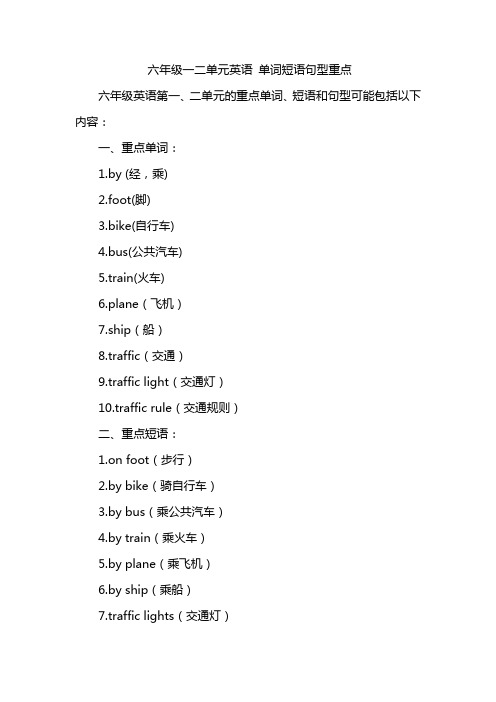
六年级一二单元英语单词短语句型重点六年级英语第一、二单元的重点单词、短语和句型可能包括以下内容:一、重点单词:1.by (经,乘)2.foot(脚)3.bike(自行车)4.bus(公共汽车)5.train(火车)6.plane(飞机)7.ship(船)8.traffic(交通)9.traffic light(交通灯)10.traffic rule(交通规则)二、重点短语:1.on foot(步行)2.by bike(骑自行车)3.by bus(乘公共汽车)4.by train(乘火车)5.by plane(乘飞机)6.by ship(乘船)7.traffic lights(交通灯)8.at home(在家)9.go to school(去上学)10.get to(到达)三、重点句型:1.How do you go to school? (你怎么去上学?)2.I go to school by bus.(我乘公共汽车去上学。
)3.How can I get to the zoo? (我怎么去动物园?)4.You can go by bus.(你可以乘公共汽车去。
)5.Look at the traffic lights.(看交通灯。
)6.Remember the traffic rules.(记住交通规则。
)7.Stop at a red light.(红灯停。
)8.Wait at a yellow light.(黄灯等。
)9.Go at a green light.(绿灯行。
)10.Don't go at a red light.(红灯不要走。
)以上是六年级英语第一、二单元的重点单词、短语和句型,希望能帮到你。
需要注意的是,具体的学习内容可能因教材版本和地区差异而有所不同。
人教版小学英语六年级全册单词表(带有音标)

人教版小学英语·六年级上册·单词表Unit 1by:经,乘foot:脚bike:自行车bus:公共汽车train:火车plane:飞机ship:船;舰subway:地铁how:怎样fifth:第五traffic:交通traffic light:交通灯traffic rule:交通规则stop:停,停车站wait:等待remember:记住get to:到达find:寻找;找到difference:不同;区别same:相同的every:每个;所有的country:国家always:总是mean:意思是drive:驾驶right:右边的side:边England:英国Australia:澳大利亚however:但是left:左边的know:知道Unit 2library:图书馆post:邮局hospital:医院cinema:书店science:科学博物馆excuse:me 对不起where:在哪里,到哪里please:请next to:与…相邻far:远supermarket:超市bank:银行want:想要buy:买get off:下车minute:分钟north:北south:南east:东west:西turn:转弯right:右边left:左边straigh:成直线地then:然后twelfth:第二十party:聚会;晚会tell 告诉start:开始take:乘坐look for:寻找Unit 3next week:下周morning:上午afternoon:下午evening:晚上tonight:今晚tomorrow:明天trip:旅行magazine:杂志cinema:去看电影theme:主题公园Great:长城busy:忙碌的together:一起地comic:漫画书post:报纸magazine:杂志dictionary:词典;字典buy:购买need:需要plant:植物else:其他;另外shop:商店Unit 4hobby:爱好collect:集邮show:展览pen pal 笔友dear:亲爱的twin:双胞胎之一something:某事物must:一定;肯定fun:快乐;乐趣with:同…reporter:记者live:居住teach:教different:不同的week:星期;周say:说soon:不久excited:兴奋的;激动的Unit 5singer:作家actor:男演员actress:女演员artis:画家Hong Kong:香港engineer:清洁工company:公司where:在哪里,到哪里work:工作factory:工厂design:设计tip:有用的小建议help:帮助money:钱well:好;对;满意地enjoy:从…获得乐趣touris:旅行者;way:路;道police:警方;警察部门Unit 6rain:雨cloud:云vapour:蒸汽;水汽sun:太阳stream:河,溪shine:照耀become:变成little:小的drop:一滴wake:up 醒来feel:感觉到think:想;思考meet:遇见high:高的other:其他的fall:落下down:向下into:进入come out:露出again:又seed:种子soil:土壤sprout:苗,芽plant:植物,种植should:应该then:然后garden:花园easy:简单的put:放several:一些day:天see:看见pot:锅碗瓢盆lovely:可爱的make sure:核实month:月份still:仍然hardly:几乎不人教版小学英语·六年级下册·单词表Unit 1tall:高的short:矮的strong:强壮的old:老的young:年轻的than:与…相比较funnier:更滑稽的heavy:重的long:长的thin:更瘦的small:小feet:脚:复数size:号码;尺码wear:穿meter:米ton:吨each:各自;每个squid:鱿鱼lobster:龙虾shark:鲨鱼deep:深的seal:海豹sperm:抹香鲸killer:whale 虎鲸even:甚至Unit 2sore:疼的feel:感觉sick:不舒服的;有病的hurt:疼痛nose:鼻子people:人们flu:流感know:知道might:可以;能worry:烦恼;担忧medicine:药drink:饮料stay:在;逗留better:更好的soon:立刻;不久tired:疲劳的,累的excited:兴奋的angry:生气的happy:高兴的bored:无聊的,烦人的sad:忧伤的,悲伤的trip:旅行fail:不及格;失败test:测试hear:听见match:比赛between:在…之间pass:传递kick:踢goal:得分bounce:反弹off:距;离;离开another:另一个guess:猜测win:赢game:比赛laugh:笑Unit 3watch:看wash:洗clean:打扫visit:看望weekend:周末went:去,go的过去式park:去公园swimming:游泳fish:钓鱼read:读hiking:郊游yesterday:昨天study:学习tongue:绕口令fiy:飞return:送回;归还swim:游泳Unit 4learn:学习sing:唱歌danced:跳舞food:食物climb:爬presents:礼物boat:划船elephant:大象skiing:滑雪how怎么,如何get:到达last:上一个的,仅余的,留在最后的relax:放松prepare:准备。
人教版小学六年级英语上册知识点总结和复习要点
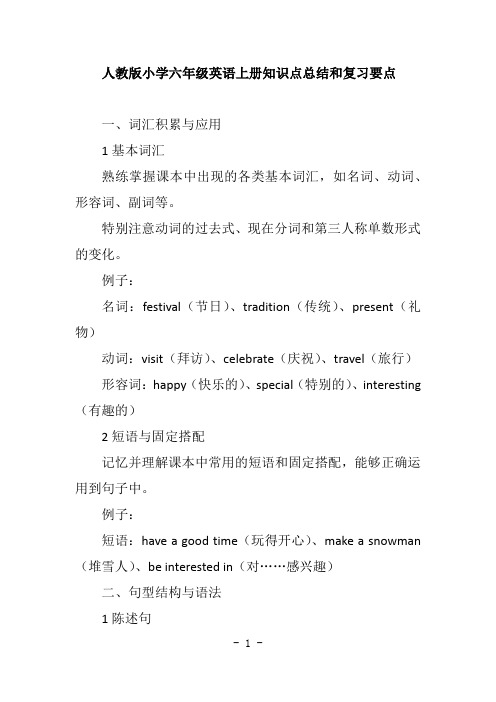
人教版小学六年级英语上册知识点总结和复习要点一、词汇积累与应用1基本词汇熟练掌握课本中出现的各类基本词汇,如名词、动词、形容词、副词等。
特别注意动词的过去式、现在分词和第三人称单数形式的变化。
例子:名词:festival(节日)、tradition(传统)、present(礼物)动词:visit(拜访)、celebrate(庆祝)、travel(旅行)形容词:happy(快乐的)、special(特别的)、interesting (有趣的)2短语与固定搭配记忆并理解课本中常用的短语和固定搭配,能够正确运用到句子中。
例子:短语:have a good time(玩得开心)、make a snowman (堆雪人)、be interested in(对……感兴趣)二、句型结构与语法1陈述句复习并巩固陈述句的基本结构,能够正确构建和表达完整的句子。
例子:陈述句:I like playing football in the afternoon.(我喜欢下午踢足球。
)2疑问句学习和掌握特殊疑问句、一般疑问句及其回答方式,能够准确理解并回答问题。
例子:特殊疑问句:What do you usually do on your birthday?(你生日通常做什么?)回答:I usually have a birthday party with my friends.(我通常和朋友们一起举办生日派对。
)3祈使句巩固祈使句的基本用法,能够正确使用祈使句表达请求、命令或建议。
例子:祈使句:Please don’t forget to bring your homework tomorrow.(请别忘了明天带作业来。
)4时态复习并巩固一般现在时、一般过去时、一般将来时和现在进行时等时态的基本用法和形式。
例子:一般现在时:She often reads books after dinner.(她晚饭后经常看书。
)一般过去时:We went to the zoo last weekend and saw many animals.(我们上周末去了动物园,看到了很多动物。
人教版小学六年级上册英语知识点【各单元】
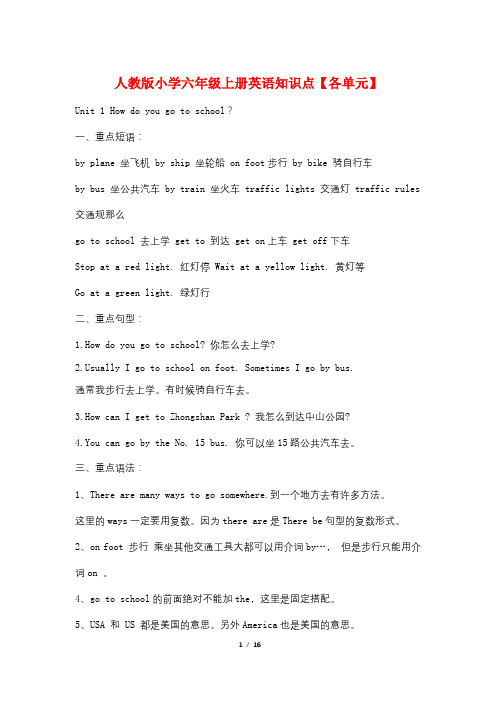
人教版小学六年级上册英语知识点【各单元】Unit 1 How do you go to school?一、重点短语:by plane 坐飞机 by ship 坐轮船 on foot步行 by bike 骑自行车by bus 坐公共汽车 by train 坐火车 traffic lights 交通灯 traffic rules 交通规那么go to school 去上学 get to 到达 get on上车 get off下车Stop at a red light. 红灯停 Wait at a yellow light. 黄灯等Go at a green light. 绿灯行二、重点句型:1.How do you go to school? 你怎么去上学?ually I go to school on foot. Sometimes I go by bus.通常我步行去上学。
有时候骑自行车去。
3.How can I get to Zhongshan Park ? 我怎么到达中山公园?4.You can go by the No. 15 bus. 你可以坐15路公共汽车去。
三、重点语法:1、There are many ways to go somewhere.到一个地方去有许多方法。
这里的ways一定要用复数。
因为there are是There be句型的复数形式。
2、on foot 步行乘坐其他交通工具大都可以用介词by…,但是步行只能用介词on 。
4、go to school的前面绝对不能加the,这里是固定搭配。
5、USA 和 US 都是美国的意思。
另外America也是美国的意思。
6、go to the park 前面一定要加the. 如果要去的地方有具体的名字,就不能再加the ,如果要去的地方没有具体名字,都要在前面加the. ( go to school 除外。
)7、How do you go to …?你怎样到达某个地方?如果要问的是第三人称单数,那么要用:How does he/she…go to …?8、反义词:get on(上车)---get off(下车) near(近的)—far(远的) fast(快的)—slow(慢的)because(因为)—why(为什么) same(相同的)—different(不同的)9、近义词:see you---goodbye sure---certainly---of course10、频度副词:always 总是,一直 usually 通常 often经常 sometimes 有时候 never 从来不针对练习I.中英互译:boat_________ taxi_______ motorbike _______ bus _______地铁轮船飞机火车附近走路骑单车上学because_______ by car _______ sometimes________ often________II.用in,on,under,by,near填空。
小学六年级上册英语重点(词组)

【导语】词汇量是制约外语学习效率的最重要因素。
词汇是构成语⾔的最基本材料,是英语的根基,始终贯穿于英语学习的整个过程,是其他⽅⾯学习的根本性前提,以下是整理的《⼩学六年级上册英语重点(词组)》相关资料,希望帮助到您。
⼩学六年级上册英语重点(词组)篇⼀ 1. be glad/happy to do sth ⾼兴去做某事 She is happy to clean theblackboard with me. be pleased to do sth⾼兴做某事 She was pleased to helpthe old man yesterday. be pleased with sth 对某事感到⾼兴/满意 The teacher was pleasedwith my answer. 2.be interested in sth/doing sth 对某事感兴趣/对做某事感兴趣 She is interested inswimming in the river. My btother is interestedin Chinese. 3. be/get ready for/to do sth be ready for 为某事做好了准备 We are ready for the exam. Be ready to do sth 为做某事做好了准备 We are ready to have a birthday party for her. get ready for sth为某事在做准备 We are getting ready for the exam. 4. be surprised to do sth 对做某事感到惊奇 be surprised at sth 对某事感到惊奇 This is nothing to be surprised at. I'd be surprised to see him on such an occasion. 5. be worth doing sth 值得做某事(worth 后接动词-ing形式,常考) It was too remote to be worth thinking about. 6. 开始去做某事begin to do sth begin/start to do/doing sth When do children begin to go to school? 7. can/be able to afford (to buy) sth 有能⼒负担(购买)…… At this rate we won't be able to afford a holiday. 8. can/may/must do sth could/would/should/might do sth We may come at another time. 9. can't wait todo sth 迫不急待地去做某事 I can’t wait to hear the news. 10. decide to do sth 决定去做某事 make up one's mind to do sth 下决⼼去做某事(常考) make a decision to do sth 对做某事作出决定 What do they decide to do? I have made up my mind to go with him⼩学六年级上册英语重点(词组)篇⼆ 1. allow sb to do sth 允许某⼈去做某事(后接动词不定式) My father allowed me to go out for a walk after finishing my homework. 2. asked sb (not) to do sth 叫某⼈做事某事(叫某⼈不要去做某事) My father asked me to study hard. He asked me not to swim alone. be asked to do sth 被叫去做某事/被邀请去做某事 I was asked to have a dinner with them yesterday. 3. be afraid to do sth 害怕做某事 She is afraid to ask me questions. 4. be afaid of doing sth 害怕做某事 I am afraid of going out at night. 5. be afaid of sth 害怕某物 He is afraid of snakes. 6. be amazed to do sth 对做某事感到惊讶 He was amazed to meet the girl there. be amazed at sth 对某事感到惊讶 they were amazed at the news. 7. be busy doing/with sth 忙于做某事(常考) I was busy washing my car at that time. 那时候我正忙于清洗我的车⼦。
- 1、下载文档前请自行甄别文档内容的完整性,平台不提供额外的编辑、内容补充、找答案等附加服务。
- 2、"仅部分预览"的文档,不可在线预览部分如存在完整性等问题,可反馈申请退款(可完整预览的文档不适用该条件!)。
- 3、如文档侵犯您的权益,请联系客服反馈,我们会尽快为您处理(人工客服工作时间:9:00-18:30)。
六上词组
1.Obey the rules 遵守规则
e to school 到学校
3.Listen to the teacher/music 听音乐
4.make noise 制造噪音
5.in class 课上
6.make a list of rules 做一张规则表
7.hand in 上交
8.on time 准时
9.ask questions 问问题
10.be quiet 安静
11.at school/home 在学校/家
12.make a mess 乱扔乱放东西
13.help to set dinner table帮助摆放饭桌
14.watch TV 看电视
15.the whole evening 整个晚上
16.read in bed 在床上看书
17.go to bed 睡觉
18.keep the room clean 保持房间干净
19.look out 小心
20.cross the road 过马路
21.wait for 等待
22.keep off the grass 不要践踏草坪
23.pick the flowers 摘花
24.take care off 照顾
25.respect old people尊敬老人
26.play on the street 在街上玩儿
27.make a sign 做标志
28.go on a social studies field trip 社会实践
29.hold up the sign 举牌子
30.point to the sign 指着牌子
31.throw the banana skin 扔香蕉皮
32.tell something about 告诉。
33.get up 起床
34.every morning 每天早晨
35.at eight twenty 在8:20
36.have classes 上课
37.from…to 从。
到。
38.get home 到家
39.do one’s homework 做作业
40.after dinner 晚饭后
41.have breakfast/lunch/dinner吃早餐42.talk about 谈论
43.in pairs/group 小组
44.be kind to sb. 对。
好
45.take a long walk 散步
46.read newspaper s/books 看报纸书
47.water the flowers 浇花
48.play with pet dogs 和宠物狗玩儿
49.go out 出去
50.go to the cinema 去电影院
51.play the piano 弹钢琴
52.go shopping/fishing 购物、钓鱼
53.stay up very late 熬夜
54.a few/little 一点儿
55.go to work 上班
56.talk with sb. 和。
谈话
57.go on with sth. 继续做。
58.have meals 吃饭
59.learn from 向。
学习
60.begin to work 开始工作
61.meet sb. 会见。
62.collect stamps 搜集邮票
63.a type of 一种。
64.a book of paper candy 一本糖纸
65.playfootball/basketball/volleybal 踢足球
66.enjoy farming/fishing喜欢耕地。
钓鱼
67.plant flowers 种花
68.grow vegetables 种菜
69.keep animals 喂养动物
70.catch nothing 什么也没拿到
71.make tools 制作工具
72.raise animals 饲养动物
73.make leaf painting 制作树叶画
74.a piece of paper 一张纸
75.the same 相同
76.in different colours 不同颜色
77.some of them 他们中的一些
78.be allowed to 允许做。
79.make sth. dirty 把。
弄脏
80.pick sb. up 用车接某人
81.give sth. to sb.=give sb sth 把。
给。
82.light the candles 点蜡烛
83.make a wish 许愿
84.blow out the candles 吹蜡烛
85.after that 打那以后
86.cut the cake 切蛋糕
87.give each one a piece 给。
一片
88.have a good time 玩的愉快
89.a cup of tea 一杯茶
90.a glass of juice 一杯果汁
91.on the same day 在同一天
92.New Year’s Day 新年
93.the Spring Festival 春节
94.Tree Planting Day 植树节
95.during Easter 复活节期间
96.get colourful Easter eggs 得到彩蛋
bour Day 劳动节
98.Mother’s Day 母亲节
99.Father’s day 父亲节100.Children’s Day 儿童节101.have exams 考试
102.work hard on studies 努力学习103.summer holiday 暑假
104.go camping 野营
105.go back to school 回到学校106.Teacher s’ Day 教师节107.National Day 国庆节108.Thanksgiving Day 感恩节109.climb a tree 爬树
110.want to do sth. 想做。
111.think of 思考。
112.get warmer and warmer越来越热e out from long sleep 冬眠后醒来114.plant seeds/rice 播种
115.farm the land 翻地
116.look at the flowers 看花117.fly kites 放风筝
118.the hottest season 最热的季节119.go to the beach 去沙滩120.enjoy themselves 他们玩的很愉快
121.make a sandcastle 堆沙堡122.look for shell 找贝壳123.be busy doing sth. 忙着。
124.pick apples 采摘苹果125.play with snow 打雪仗126. sweep the snow 扫雪
127. make a snowman 堆雪人128. cut the grass 割草129. look into the water 往水里看130. egg head 鸡蛋头131. make a calendar 制作日历132. have a barbeque 烧烤。
